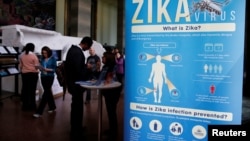The World Health Assembly has approved reforms that will increase the U.N. health agency's ability to respond rapidly and more effectively to health emergencies. In Geneva, a panel of experts discussed how new measures will help countries tackle emergencies, such as Ebola, Zika, and yellow fever.
Piecemeal reforms of the emergency health system have been under way for years; but, it was the unprecedented Ebola epidemic in West Africa that triggered a serious overhaul of the World Health Organization's method of response.
While Ebola was declared in Guinea in March 2014, it took the WHO five months and many deaths before it pronounced Ebola an international public health emergency. Doctors Without Borders, or MSF, was an early and vocal critic of the agency's slow response to Ebola — a disease that killed more than 11,000 people by the time it was declared over in December.
Joanne Liu, president of MSF, said the global fear Ebola generated resulted in a cascade of initiatives for reform.
"The creation of the new WHO Health Emergencies Program is a positive step forward; but, we know there is no quick fix," she said. "There is no cheap fix. So, without the 'buy-in' of member states and strong leadership, it will die on paper."
The World Health Organization reports 130 million people worldwide need humanitarian assistance and all are in need of health assistance today.
WHO Director-General Margaret Chan said outbreaks such as Ebola, if not managed early, can get out of hand and become a humanitarian crisis. She said the WHO and its partners are working very hard to manage the Zika outbreak.
"The Zika outbreak is now rampaging so many countries and not just in the Americas region, but Zika is at the doorstep of Africa now," she said. "… With movement of people ... around the world, this is the kind of thing we should expect. …We need to be prepared so that every country has the capability and capacity to prevent, to detect, and to respond to any emergencies."
Chan said emergencies have become the new normal.
Brazil is the epicenter of the Zika outbreak. The country has confirmed thousands of cases of the Zika virus and hundreds of pregnant women with microcephaly, linked to brain disorders in newborn babies.
Brazilian health minister Fonseca Santos said his country has increased its surveillance system and undertaken a vigorous vector control program. He said it is investing $250 million in research.
"The most important lesson," he said, "was that we should be prepared all the time, even for a disease that we are used to and we believe sometimes that we know everything about it and it can still surprise us anytime and become an emergency."
Yellow fever has spread from Angola to the Democratic Republic of Congo, which has confirmed 41 imported cases.
Bokenge Bosua of the DRC Ministry of Health said his government has drawn up a response plan, which focuses on prevention and preparation. He said a vaccination campaign began Thursday in the capital, Kinshasa, and will last until June 6.
"Also, we are focusing on mandatory vaccinations for travelers to Angola," he said. "… Anyone who goes to Angola needs to be vaccinated against yellow fever."
While most of the experts dwelled upon the reforms in regard to emerging diseases, MSF President Joanne Liu reminded them that the threat to health was not limited to infectious diseases.
"From Yemen to Syria, from Central Africa Republic to Niger: health facilities are looted, burned and bombed," she said. "Patients are slaughtered in their beds. Health workers are abducted, assaulted and killed."
A new WHO report on attacks on health care in emergencies found more than 60 percent in the last two years were intentional. It said health facilities and health workers are deliberately targeted and the attacks, which deprive thousands of people of essential care, are not stopping.




